Related Research Articles

Christoph Martin Wieland was a German poet and writer, representative of literary Rococo. He is best-remembered for having written the first Bildungsroman, as well as the epic Oberon, which formed the basis for both Friederike Sophie Seyler's opera of the same name and Carl Maria von Weber's opera of the same name. His thought was representative of the cosmopolitanism of the German Enlightenment, exemplified in his remark: "Only a true cosmopolitan can be a good citizen." He was a key figure of Weimar Classicism and a collaborator of Abel Seyler's theatre company.
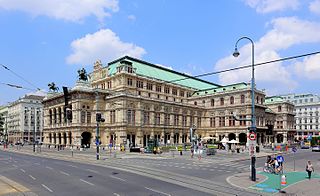
Opera in German is that of the German-speaking countries, which include Germany, Austria, and the historic German states that pre-date those countries.
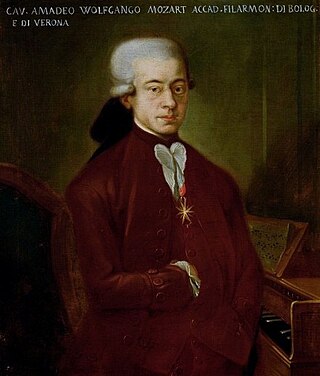
Die Schuldigkeit des ersten Gebots, K. 35, is a sacred musical play composed by Wolfgang Amadeus Mozart in 1767 when he was 11 years old. It is Mozart's first opera or, more specifically, sacred drama, as is suggested by the name. The libretto is now attributed to Ignatz Anton von Weiser, although Johann Adam Wieland or Jakob Anton Marianus Wimmer had been suggested earlier. Only the first part of the opera was composed by Mozart; the second and third parts were contributed by Michael Haydn and Anton Cajetan Adlgasser respectively. However, these other two parts have not survived. Part 1 of the opera was first performed on March 12, 1767, in the Knight's Hall of the Palace of the Archbishop, the Salzburg Residenz. Part 2 was performed on March 19, and part 3 on March 26.
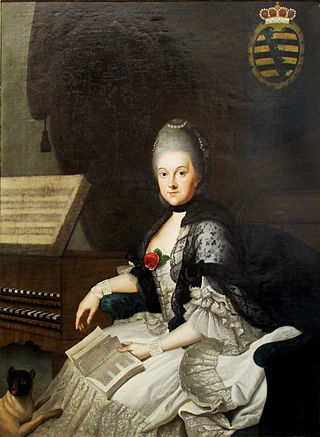
Anna Amalia of Brunswick-Wolfenbüttel, was a German princess and composer. She became the duchess of Saxe-Weimar-Eisenach by marriage, and was also regent of the states of Saxe-Weimar and Saxe-Eisenach from 1758 to 1775. She transformed her court and its surrounding into the most influential cultural center of Germany. Her invitation of Abel Seyler's theatre company in 1771 marked the start of Weimar Classicism, that would include such figures such as Wieland, Goethe, Herder and Schiller working under her protection.

Anton Schweitzer was a German composer of operas, who was affiliated with Abel Seyler's theatrical company.
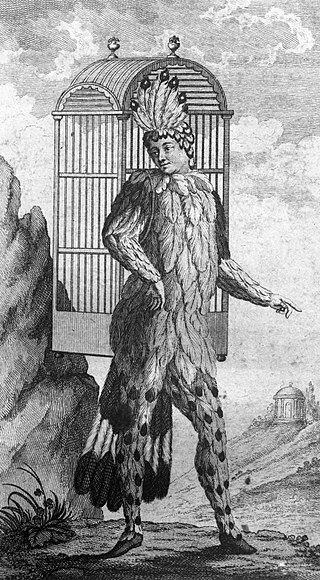
Emanuel Schikaneder was a German impresario, dramatist, actor, singer, and composer. He wrote the libretto of Wolfgang Amadeus Mozart's opera The Magic Flute and was the builder of the Theater an der Wien. Peter Branscombe called him "one of the most talented theatre men of his era". Aside from Mozart, he worked with Salieri, Haydn and Beethoven.
Ignaz Jakob Holzbauer was an Austrian composer of symphonies, concertos, operas, and chamber music, and a member of the Mannheim school. His aesthetic style is in line with that of the Sturm und Drang "movement" of German art and literature.

Peter Winter, later Peter von Winter, was a German violinist, conductor and composer, especially of operas. He began his career as a player at the Mannheim court, and advanced to conductor. When the court moved to Munich, he followed and later became kapellmeister of the opera there. His opera Das Labyrinth, a sequel to Mozart's Die Zauberflöte, was premiered in Vienna in 1798, and his Maometto at La Scala in Milan in 1817. His work has been regarded as a bridge between Mozart and Weber in the development of German opera.

Georg Anton Benda was a composer, violinist and Kapellmeister of the classical period from the Kingdom of Bohemia.

Marie Sophie von La Roche was a German novelist. She is considered the first financially independent female professional writer in Germany.

Günther von Schwarzburg is a Singspiel in three acts by Ignaz Holzbauer set to a German libretto by Anton Klein. Loosely based on events in the life of the 14th-century German king, Günther von Schwarzburg, the opera premiered on 5 January 1777 at the Hoftheater in the Mannheim Palace.

Friederike Sophie Seyler was a German actress, playwright and librettist. Alongside Friederike Caroline Neuber, she was widely considered Germany's greatest actress of the 18th century; Gotthold Ephraim Lessing described her in his Hamburg Dramaturgy as "incontestably one of the best actresses that German theatre has ever seen."

Schlosstheater Schwetzingen is a court theater in Schwetzingen, Baden-Württemberg, Germany. The historic building, opened in 1753, is part of Schloss Schwetzingen and since 1952 the principal venue of the Schwetzingen Festival. It is also called Hoftheater, Hofoper, and Comoedienhaus. The frequently applied name Rokokotheater is misleading, because it shows also neoclassical elements, added in 1762.

Abel Seyler was a Swiss-born theatre director and former merchant banker, who was regarded as one of the great theatre principals of 18th century Europe. He played a pivotal role in the development of German theatre and was considered "the leading patron of German theatre" in his lifetime. He supported the development of new works and experimental productions, helping to establish Hamburg as a center of theatrical innovation and to establish a publicly funded theater system in Germany. Working with some of Germany's foremost actors and playwrights of his era, he is credited with pioneering a new more realist style of acting, introducing Shakespeare to a German language audience, and with promoting the concept of a national theatre in the tradition of Ludvig Holberg, the Sturm und Drang playwrights, and serious German opera, becoming the "primary agent for change in the German opera scene" in the late 18th century. Already in his lifetime, he was described as "one of German art's most meritorious men."

The Seyler Theatre Company, also known as the Seyler Company, was a travelling theatrical company founded in 1769 by Abel Seyler. It was one of the most famous and ambitious theatrical companies of Europe in the years from 1769 to 1779, and played a crucial role in theatrical innovation, the development of a serious German opera tradition, and the Sturm und Drang movement. The Sturm und Drang period is named for a play commissioned by the Seyler company.

Alceste is an opera in German in five acts by Anton Schweitzer with a libretto by Christoph Martin Wieland. It was commissioned by Abel Seyler for the Seylersche Schauspiel-Gesellschaft, and premiered on 28 May 1773 at the Hoftheater Weimar. Considered a milestone of German opera, it was revived in Weimar and recorded in 1999.
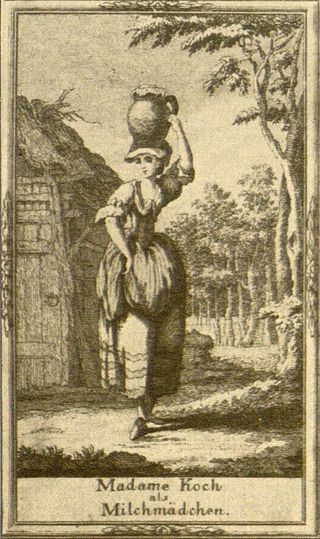
Franziska Romana Koch, née Gieraneck, Giwraneck, Giraneck, Jiránek (1748–1796) was a German ballet dancer, soprano, and actress. First a dancer as the member of the theatre company Kochische Gesellschaft, she also trained her voice and worked at the court theatre of Weimar. Anton Schweitzer composed the opera Alceste for her, and its librettist Christoph Martin Wieland celebrated her performance in the title role in a poem. She later worked in Gotha, and finally in Leipzig as a member of Bondini's company, where she retired in 1787.

Ernst Christoph Dressler was a German composer, operatic tenor, violinist and music theorist. He began his career as a self taught singer and violinist, but eventually received vocal training from the renowned Italian opera singer Maria Giustina Turcotti. He became a musician at several courts before he moved to the Court Opera in Vienna and finally to Kassel. He is known for a march on which Beethoven based his first published composition.
Johann Peter Ritter was a German composer, conductor, chorus master, and cellist born and died in Mannheim, Karlsruhe, Baden-Württemberg, Germany). He is best known in the United States for "Sun of My Soul" and "Holy God, We Praise Thy Name."
References
- ↑ Kongressbericht, International Musicological Society. Congress 1977. p. 249: "With Rosamunde, Wieland's theories were beginning to disintegrate under the press of an intractable subject and a court steeped in both French and Italian operatic traditions. In his Versuch Wieland had inveighed against spectacle (impracticable for the most part at Weimar in any case), yet included a generous measure when Mannheim offered him the opportunity. ... "
- ↑ Thomas Bauman, North German Opera in the Age of Goethe (1985) ISBN 0521260272 p. 116: "When the Gotha Court Theater was formed in 1775, Schweitzer did not leave with Seyler but remained at Gotha as the music director of the new ... Most of his creative activities came in collaboration with the Weimar court, most notably a commission that Wieland and he provide a new serious opera along the lines of Alceste for the court at Mannheim, from which resulted their ill-starred Rosamunde."
- ↑ Jonathan Schaake (25 May 2012). "Rosamunde in Schwetzingen – Lauter Rachearien". Frankfurter Allgemeine Zeitung (in German). Retrieved 26 November 2023.
- ↑ "(review)",[ dead link ] Südwestrundfunk (in German) "C. M. Wielands und Anton Schweitzers Singspiel von 1779 misst ihr derart Gewicht zu, dass der im 12. Jahrhundert angesiedelte historische Hintergrund, die Geschichte Heinrich Plantagenets (späteren Heinrich II von England) und seiner Ehe mit der ehemaligen französischen Königin Eleonore von Aquitanien, als bloßes Dekor dient für eine Liebesleidtragödie, ausgelöst durch den Giftmordversuch Eleonores an der Geliebten ihres Mannes [ Rosamund Clifford ]."
- ↑ "Opernausgrabung bei den Schwetzinger Festspielen: Rosamunde von Anton Schweitzer (Premiere: 20. 5. 2012), Der Neue Merker (in German)